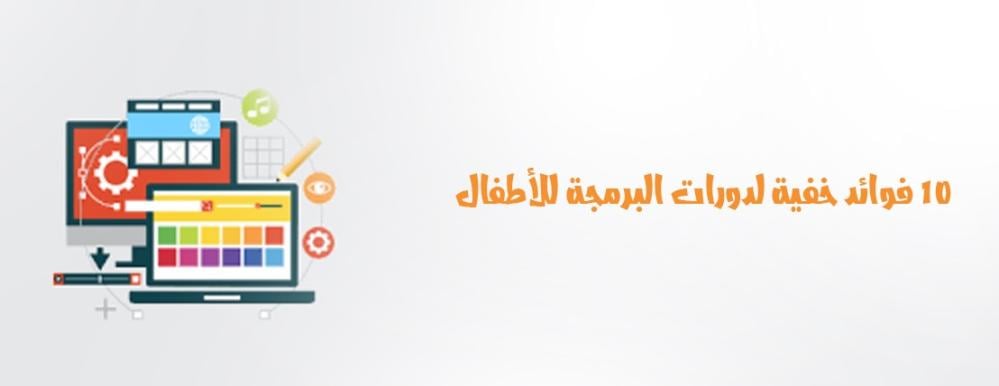
10 Hidden Benefits of Coding Courses for Kids
Your guide to understanding how coding can reshape your child's mindset toward creativity and success.
In a world where technological advancement is accelerating rapidly, coding is no longer just an extra skill—it's now a core element of modern education and one of the strongest tools for building a promising future.
While many parents are aware of the general importance of teaching coding to children, there are hidden (and sometimes surprising!) benefits that might completely change how you view these courses.
In this article, we reveal 10 hidden benefits that make coding courses a smart choice for developing your child’s mental, social, and behavioral skills.
📉 1. Coding Teaches Logical and Structured Thinking
When kids learn to code, they first learn how to think step-by-step, break down problems, and solve them piece by piece.
This logical approach reflects in their daily /p>
Example: Instead of getting upset over a broken toy, your child might ask: "Is the battery dead? Is a button stuck?" That’s the kind of calm, problem-solving mindset we want to build.
📉 2. Boosts Problem-Solving Skills
Kids learn best through trial and error.
In coding, mistakes are called "bugs," and fixing them enhances the child's analytical and exploratory thinking.
Studies show that kids who learn coding become better problem solvers in academics and life.
📉 3. Enhances Creativity (Not Just Technical Skills!)
Think coding is dry or boring? Think again!
By creating games, apps, interactive stories, and robots, coding stimulates the imagination and turns it into real-life results.
It’s not just typing commands—it’s a creative toolbox for expression.
📉 4. Builds Patience and Perseverance
When a child fails multiple times before successfully running their code, they internalize a powerful lesson:
"Persistence leads to success."
Coding teaches this value not through lectures, but through hands-on experience.
📉 5. Boosts Confidence Through Achievement
Imagine a child creating a simple game or app from scratch, then proudly showing it to friends or family!
That sense of accomplishment gives them genuine self-esteem that goes beyond grades.
📉 6. Opens Incredible Future Opportunities
Is it too early to think about careers? Not really.
The world is shifting toward STEM fields (Science, Technology, Engineering, Math), and coding is the gateway to them all.
Careers like game development, AI programming, software engineering, and cybersecurity often begin with early exposure to coding.
📉 7. Encourages Teamwork and Collaboration
In group coding projects (even online), kids learn how to contribute to a team, give and receive feedback, and discuss ideas.
These soft skills don’t always appear in regular classes but shine during coding teamwork.
📉 8. Improves Language and Math Skills
Surprise: coding enhances academic performance too!
Math: Through logic, numbers, and variables.
Language: By learning to communicate clearly, follow syntax rules, and use English tech terms.
📉 9. Expands Global Cultural Awareness
Through coding competitions or online communities, kids interact with peers from around the world and learn how to function in digital global teams.
Platforms like Scratch and Code.org showcase student projects globally.
📉 10. Builds Smart Digital Citizens, Not Just Consumers
Instead of just consuming tech (games, videos), coding empowers kids to create it.
Imagine the difference between a child who plays a game and one who builds one.
💡 Where Can Kids Learn Coding?
In-Person Courses: Interactive, hands-on learning with physical tools and face-to-face guidance.
Online Courses (Zoom): Flexible schedules, accessible from anywhere—ideal for busy families.
Self-Learning Platforms: Tools like Scratch, Tynker, and CodeMonkey let kids learn at their own pace through games and challenges.
Specialized Centers like Jil Alpha: Offer instructor-led projects, real-world applications, and official participation certificates.
👩🏫 What Does Jil Alpha Coding Center Offer?
Jil Alpha offers diverse, age-appropriate programs, including:
- Robotics for Kids (Ages 5–9)
- EV3 Robotics for Older Kids
- Micro:bit Programming
- Game Design Courses
- Intensive Summer Coding Camps
- Arduino for Beginners
- Scratch Programming for Foundations
All sessions are led by experienced female instructors and include practical projects and certified attendance.
🤔 Frequently Asked Questions by Parents
Does my child need to know English to code? No. Beginners often use visual programming with optional Arabic support.
What age is best to start? From age 5 (visual coding). Text-based coding usually starts around 9–10.
Is coding hard for kids? Not at all! Kid-friendly platforms make it feel like fun and play rather than studying.
✨ Conclusion: Are Coding Courses Worth the Hype?
Absolutely!
Not only do they prepare kids for a tech-based future, but they also:
- Improve critical thinking
- Inspire creativity
- Build real confidence
- Open up global opportunities

